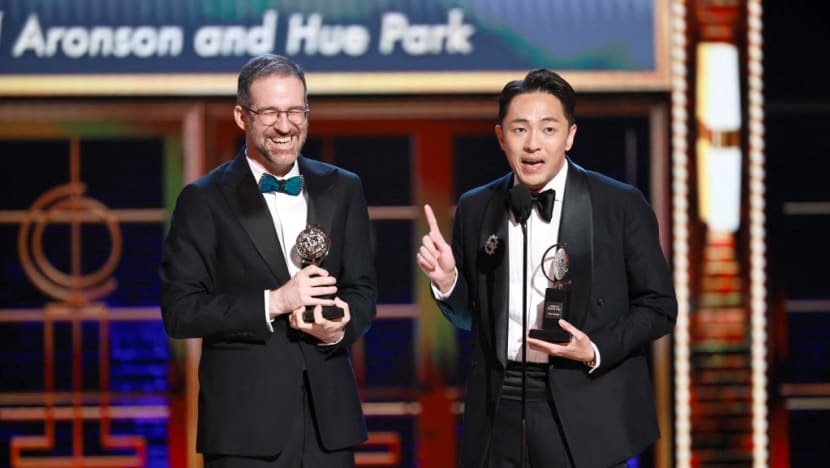Commentary: As South Korean artistes clinch prestigious US awards, what’s next for Hallyu?
For those only paying attention to Western entertainment, the grass seems to be getting more Korean – but this change hasn’t been one-way, says CNA TODAY’s Melissa Lee.

Will Aronson and Hue Park accept the Best Book of a Musical award for Maybe Happy Ending at The 78th Annual Tony Awards on Jun 8, 2025 in New York City. (Photo: AFP/Theo Wargo/Getty Images for Tony Awards Productions)

This audio is generated by an AI tool.
SINGAPORE: In news that rippled through the global entertainment scene, South Korean musical Maybe Happy Ending scooped up six Tony awards, becoming one of the most celebrated Broadway shows of the year.
Hue Park became the first South Korean to win a Tony award. Park – who co-wrote Maybe Happy Ending with long-time collaborator Will Aronson – earned trophies for best book of a musical and best original score.
These wins have launched South Korean entertainment into EGOT territory.
EGOT is a label reserved for artistes who have clinched major awards across the Emmys, Grammys, Oscars and Tonys. These paragons of creative and performing arts, such as Audrey Hepburn and Barbra Streisand, usually hail from the West, but South Korea has joined the fray.
Parasite director Bong Joon-ho wasvthe first South Korean to win an Oscar, while opera singer Sumi Jo was the first to win a Grammy. In 2022, Squid Game’s Hwang Dong-hyuk and Lee Jung-jae became the first Asians to win Emmys for best drama director and male actor respectively.
It’s a little strange to think of a country “achieving” EGOT status, but South Korea’s achievement is particularly fascinating in the wake of the K-wave that has swept across the world.
Is Maybe Happy Ending’s Tony sweep a turning point for Hallyu? Is South Korean entertainment officially “prestige” now?
SURPRISE HIT
Maybe Happy Ending, a tale about two robots who find love, was first staged in Seoul in 2016. When its American adaptation debuted on Broadway in November 2024, nobody expected much.
Featuring a cast of just four and a chamber orchestra, it’s a relatively small production when huge ensemble casts, large orchestras and lavish sets are the norm for Broadway.
The doubts went beyond the show’s makeup. New original musicals rarely flourish in an environment dominated by long-running shows such as Chicago and Wicked, popular intellectual property (IP) adaptations including The Lion King and Aladdin, or jukebox musicals like MJ The Musical and Mamma Mia!.
People also weren’t sure what to make of an American adaptation of a South Korean musical. Were South Korean musicals even a thing?
I was fortunate enough to have seen the show on Broadway earlier this year. I thoroughly loved it – lead actor Darren Criss and company were impressively capable, and the music effectively evoked big emotions without blaring sounds.
In an entertainment landscape dominated by too many overfamiliar IPs, Maybe Happy Ending also offers a truly unique story, one that hits audiences in the heart again and again throughout its short 90-minute runtime. No wonder it became a surprise runaway hit, largely through word-of-mouth among theatre fans and on social media.
Long after I left the theatre, I found myself ruminating on what the show represents in a fast-growing but still ambiguous space: the intersection of Western and South Korean arts and entertainment.
A K-POP INVASION?
Since Psy’s Gangnam Style crossed 1 billion views on YouTube in 2012, the “K-pop invasion” has been widely discussed, echoing the British invasion of the 60s that stamped UK bands into American consciousness.
It’s only been ramping up since, with K-pop groups appearing at major Western music awards and festivals, and more South Korean TV and film productions finding audiences and acclaim in North America and Europe.
For anyone only paying attention to the Western side of the fence, the grass does seem to be getting more and more Korean. However, this intrusion hasn’t been one-way.
As much as the West is getting influenced by South Korea, South Korea has also been getting more Westernised. It’s a well-known fact that big K-pop academies and training schools use Western entertainers like Beyonce and Tinashe as models in their training programmes.
More and more, we see Korean actors picking up English to broaden their horizons, as Park Seo-joon and Lee Jung-jae recently did to appear in big Marvel and Star Wars projects respectively.
The Korean theatre scene has seen an influx of modern Western works over the last few years, including contemporary favourites such as Hadestown. The Korean production of Chicago in particular has been lauded for creative choreography and performance variations, winning over Western theatre fans online. Instead of holding the Broadway or Hollywood iterations up as the gold standard, many outright declare the Korean productions superior.
WHEN COMPETITION TURNS INTO COLLABORATION
With all this in view, the partnership behind Maybe Happy Ending seems like the next natural step. Park and Aronson stated that Maybe Happy Ending was developed as both a South Korean and US production concurrently from the very beginning.
Perhaps this is where Hallyu is going next – not just a visitor carving out its own space in Western arts and culture, but a full-fledged collaborator.
This may have started out with South Korea studios and labels training and developing more Westernised idols for mass market appeal, but the trend has taken on a life of its own.
For instance, Blackpink could be classed as one such K-pop group, with three out of four members already fluent in English before being recruited into the group. But now, all three are becoming “Western” artistes in a completely different way.
In recent months, Lisa appeared in the latest season of popular TV series The White Lotus, Jennie performed as a solo artiste at Coachella, and Rose saw monumental success with her viral English-language hit Apt (a collaboration with US singer Bruno Mars).
They’re not just K-pop idols singing their discography in English – a strategy that failed for the Wonder Girls when they attempted to enter the US market 15 years ago.
Their creative offerings are fundamentally more rooted in Western sensibilities. A colleague recently noted that whenever Jennie’s songs come up on the radio, she can't distinguish between her music and that of other Western pop stars.
Of course, there are dangers to an overwhelming cultural hegemony. South Korean artistes shouldn’t be pressured to start creating “Western art” to survive or find success, and vice versa for Western artistes.
However, the opening up of new avenues for cross-cultural collaboration is exciting in its own right, especially when it produces gems such as Maybe Happy Ending. Perhaps the real danger in this day and age is attempting to identify anything as purely American or South Korean.
Melissa Lee is Deputy Editor at CNA TODAY.


















